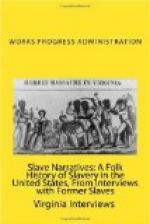“De mos’ fun was de corn shuckin’. Dey was two captains an’ each one picked de ones he wanted on his side. Den de shuckin’ started. You can’t make mention o’ nothin good dat us didn’ have t’eat after de shuckin’. I still studies’ bout dem days now.
“Dey was big parties at de white folks’ house, me, all dressed up wid taller[FN: tallow] on my face to make it shine, a-servin’ de gues’es[FN: guests].
“One time, jus’ when ever’thing was a-goin’ fine, a sad thing happened. My young mistis, de one named for her ma, ups an’ runs off wid de son o’ de Irish ditch digger an’ marries ‘im. She wouldn’ a-done it if dey’d a-let ‘r marry de man she wanted. Dey didn’ think he was good ’nough for her. So jus’ to spite’ em, she married de ditch digger’s son.
“Old Mis’ wouldn’ have nothin’ more to do wid ’er, same as if she warnt her own chil’. But I’d go over to see ‘er an’ carry milk an’ things out o’ de garden.
“It was pitiful to see my little miss poor. When I couldn’ stan’ it no longer I walks right up to Old Mis’ an’ I says, ‘Old Mis’, does you know Miss Farrell aint got no cow.’ She jus’ act lak she aint hear’d me, an’ put her lips together dat tight. I couldn’ do nothin’ but walk off an’ leave her. Pretty soon she called, ‘Prince!’ I says, ‘Yes mam.’ She says, ‘Seein’ you is so concerned ‘bout Miss Farrell not havin’ no cow, you better take one to ‘er.’ I foun’ de rope an’ carried de bes’ cow in de lot to Miss Farrell.
“Shortly after dat I lef’ wid Old Marster to go to North Carolina. Jus’ ‘fore de war come on, my marster called me to’ im an’ tol’ me he was a-goin’ to take me to North Carolina to his brother for safe keepin’. Right den I knowed somethin’ was wrong. I was a-wishin’ from de bottom o’ my heart dat de Yankees ‘ud stay out o’ us business an’ not git us all ‘sturbed in de min’.
“Things went on at his brother’s place ’bout lak dey done at home. I stayed dere all four years o’ de war. I couldn’ leave ’cause de men folks all went to de war an’ I had to stay an’ pertec’ de women folks.
“De day peace was declared wagon loads o’ people rode all th’ough de place a-tellin’ us ‘bout bein’ free. De old Colonel was killed in battle an’ his wife had died. De young marster called us in an’ said it was all true, dat us was free as he was, an’ us could leave whenever us got ready. He said his money warnt no good anymore an’ he dida’ have no other to pay us wid.
“I can’t recollec’ if he got new money an’ paid us or not, but I do ‘member ever’ las’ one o’ us stayed.
“I never lef’ dat place’ til my young marster, Mr. Jim Johnson, de one dat was de Supreme Judge, come for me. He was a-livin’ in South Carolina den. He took us all home wid ’im. Us got dere in time to vote for Gov’nor Wade Hamilton. Us put ‘im in office, too. De firs’ thing I done was join de Democrat Club an’ hoped[FN: helped] ’em run all o’ de scalawags away from de place. My young marster had always tol’ me to live for my country an’ had seen ‘nought of dat war to know jus’ what was a-goin’ on.




